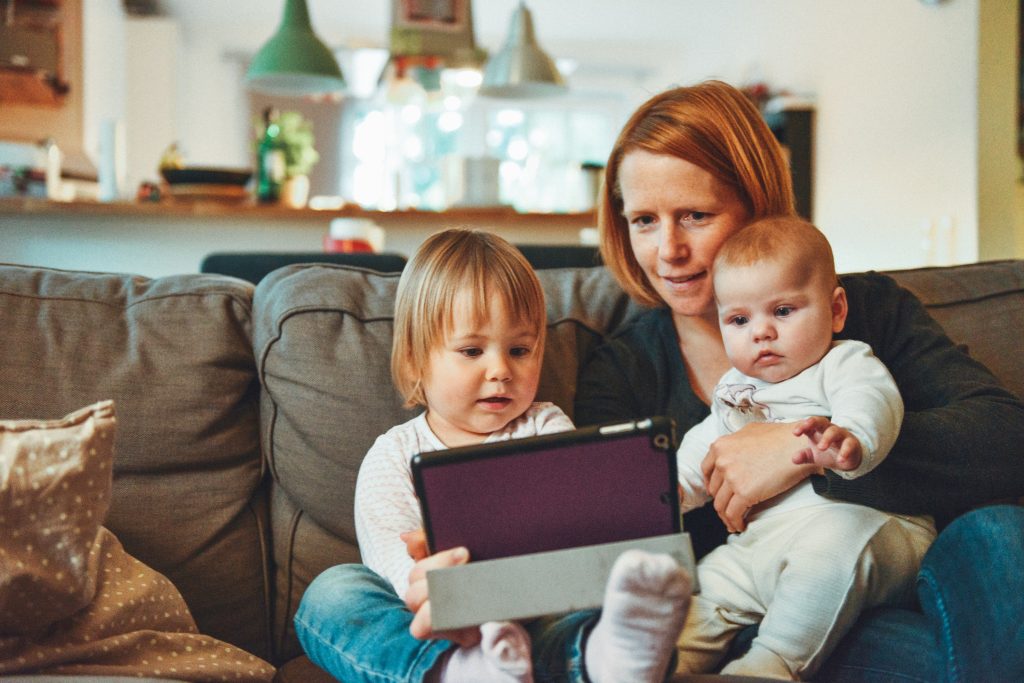
05 Feb How to Handle Screen Time in a Pandemic
This #ChildrensMentalHealth week in the UK, we are focusing on how to handle screen time with children in the pandemic. One study comparing screen time in January 2020 with January 2021, has discovered that there has been a 100% increase in website and app visits, by four to fifteen year olds in the UK, with the average daily time spent on them increasing by 15%.
Of course, as children are stuck at home and learning online, it is totally understandable that their screen time will have increased, as it has for everyone. But for children in particular, this can be damaging. One area of concern is eyesight, with data published recently uncovering a 300% increase in shortsightedness amongst six to eight year olds, potentially caused by online learning. In another study, overuse of social media, screen time and mental health issues were all raised as the primary worries of parents during the pandemic. These studies suggest that there are plenty of concerns felt both in both academic and parenting circles about how to handle screen time in the pandemic.
We’ve put together some basic questions that you can ask of yourself, to help you gauge how much screen time your children should be exposed to.Is this helping or harming?
The first and most important question to ask is what is the purpose of the screen time your child is engaged with? Much of the cause for increased screen time during the pandemic has been that schools have been closed for months, forcing children to be educated online instead of in a physical classroom. These hours on Zoom with classmates and teachers offer a very different purpose and result than the hours watching YouTube videos for example.
Therefore, when deciding which types of screen time to reduce and manage you must gauge the effect. One might even decide that online gaming with friends from school for a limited time could be considered a positive as it offers the social interaction children are losing in this time. How you evaluate your child’s use of their screens is up to you, but make sure that any blanket statements such as “you’re not using screens after school” are nuanced by an understanding of the positives and negatives of various forms of screen use.
Which screens are most detrimental?
As well as evaluating what uses of screens are helpful vs. harmful it is also useful to evaluate which devices themselves are the most detrimental. For example, we often forget that the TV counts as a screen and so discount it from our rules on screen time. However, 22% of 12-15 year olds have stated that TV watching led them to neglect their school work. So, consider all devices, no matter how big or small, in negotiating screen time with your children.
What does harm look like?
In order to create a system for evaluating screen usage across time, devices, and generations we must first define what ‘harmful’ screen time would look like. This can be a personal consideration as only you will know what it looks like if your child’s behaviour seems to be impacted by screen time. However, there are some common themes, which we have written about before, that you can rely on to help you pick up on when a change may need to be introduced.
Sleep is a good indicator of screen time intruding on the rest of our lives as sleep can be very badly impacted by excess screen time. Concentration and general mental health are also markers to watch. So, if you notice that your children are more tired, less focused and generally in a worse mood- it is time to evaluate their time spent on screens.
Understanding that screen time has inevitably rocketed, and that there’s a limited amount you can do about it, will help you see that you shouldn’t be overly anxious about any too-strict count of hours on a device. Focus on the basics; whether your child is healthy, happy, sleeping and eating well and enjoying life, and if their time on screens is enhancing, or detracting from any of that, and you can’t go wrong.






Sorry, the comment form is closed at this time.